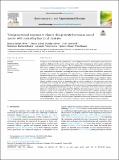Por favor, use este identificador para citar o enlazar a este item:
http://hdl.handle.net/10261/262910COMPARTIR / EXPORTAR:
 SHARE SHARE
 CORE
BASE CORE
BASE
|
|
| Visualizar otros formatos: MARC | Dublin Core | RDF | ORE | MODS | METS | DIDL | DATACITE | |

| Título: | Transgenerational responses to climate change in Mediterranean annual species with contrasting functional strategies |
Autor: | Gallego-Tévar, Blanca CSIC ORCID; Hidalgo Gálvez, María Dolores CSIC ORCID; Cambrollé, Jesús CSIC ORCID; Martínez Muñoz, M.; Villar Godoy, A.; Pérez-Ramos, Ignacio Manuel CSIC ORCID | Palabras clave: | Acquisitive species Conservative species Drought Maternal effects Phenotypic plasticity Warming |
Fecha de publicación: | abr-2022 | Editor: | Elsevier | Citación: | Environmental and Experimental Botany 196: 104817 (2022) | Resumen: | Increasing temperature and aridity predicted by climate change models in the Mediterranean region will pose a significant challenge for the survival of some plant species. The mechanisms by which species modify their phenotype across generations in response to the environment have been identified as essential to cope with the new climatic conditions. However, this transgenerational transfer remains unexplored for species with contrasted resource-use strategies (fast-growing or acquisitive versus stress-tolerant or conservative species). For this purpose, transgenerational responses to warming and drought of annual plant species with different resource-use strategies were assessed by conducting three experiments. In a field experiment, climatic treatments of increased temperature and rainfall exclusion were imposed on five herbaceous species typical of Mediterranean grasslands. The descendants of the individuals sampled in the field were employed in two greenhouse experiments to: (1) analyze the transgenerational response by re-imposing warming and drought conditions, and (2) identify possible maternal effects by maintaining them at optimal conditions of air temperature and water availability and comparing with maternal performance. We measured reproductive output, plant growth and survival variables as plant performance indicators. We found contrasting transgenerational responses to warming and drought depending on the functional strategy of the species. Direct effects of the abiotic stressors on parental plants were retained or new ones appeared in their offspring, with special negative impact on one of the most acquisitive species (Crepis capillaris). In contrast, the most conservative species (Bromus madritensis) highly tolerated increased climatic stress but deleterious maternal effects were registered, given the high negative impact on the performance of the descendants of maternal plants that were subjected to climatic treatments. Our study highlights the importance of evaluating plant responses to stress across generations to better understand their potential ability to face new environmental conditions in species with different functional strategies. © 2022 The Authors | Descripción: | 11 páginas.- 4 figuras.- 3 tablas.- 89 referencias.- Supplementary data associated with this article can be found in the online version at doi:10.1016/j.envexpbot.2022.104817 | Versión del editor: | http://dx.doi.org/10.1016/j.envexpbot.2022.104817 | URI: | http://hdl.handle.net/10261/262910 | DOI: | 10.1016/j.envexpbot.2022.104817 | ISSN: | 0098-8472 |
| Aparece en las colecciones: | (IRNAS) Artículos |
Ficheros en este ítem:
| Fichero | Descripción | Tamaño | Formato | |
|---|---|---|---|---|
| 1-s2.0-S0098847222000399-main.pdf | 1,3 MB | Adobe PDF |  Visualizar/Abrir |
CORE Recommender
SCOPUSTM
Citations
3
checked on 05-may-2024
WEB OF SCIENCETM
Citations
3
checked on 28-feb-2024
Page view(s)
67
checked on 07-may-2024
Download(s)
119
checked on 07-may-2024
Google ScholarTM
Check
Altmetric
Altmetric
Este item está licenciado bajo una Licencia Creative Commons

